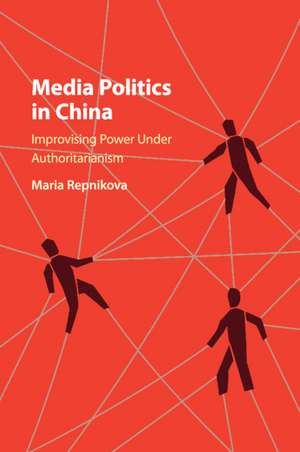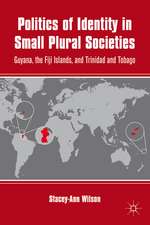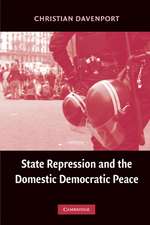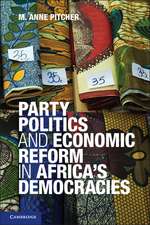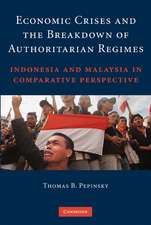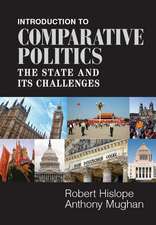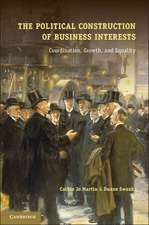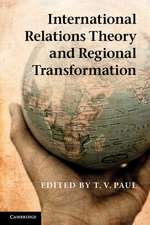Media Politics in China: Improvising Power under Authoritarianism
Autor Maria Repnikovaen Limba Engleză Paperback – 19 dec 2018
| Toate formatele și edițiile | Preț | Express |
|---|---|---|
| Paperback (1) | 284.98 lei 6-8 săpt. | |
| Cambridge University Press – 19 dec 2018 | 284.98 lei 6-8 săpt. | |
| Hardback (1) | 516.57 lei 6-8 săpt. | |
| Cambridge University Press – 14 iun 2017 | 516.57 lei 6-8 săpt. |
Preț: 284.98 lei
Nou
Puncte Express: 427
Preț estimativ în valută:
54.53€ • 57.20$ • 45.40£
54.53€ • 57.20$ • 45.40£
Carte tipărită la comandă
Livrare economică 01-15 aprilie
Preluare comenzi: 021 569.72.76
Specificații
ISBN-13: 9781316647158
ISBN-10: 1316647153
Pagini: 283
Ilustrații: 3 b/w illus. 6 tables
Dimensiuni: 150 x 230 x 14 mm
Greutate: 0.39 kg
Editura: Cambridge University Press
Colecția Cambridge University Press
Locul publicării:Cambridge, United Kingdom
ISBN-10: 1316647153
Pagini: 283
Ilustrații: 3 b/w illus. 6 tables
Dimensiuni: 150 x 230 x 14 mm
Greutate: 0.39 kg
Editura: Cambridge University Press
Colecția Cambridge University Press
Locul publicării:Cambridge, United Kingdom
Cuprins
Part I. Conceptual Frameworks: 1. Introduction; 2. Payoffs; Part II. Mutual Objectives and Routine Dynamics: 3. Unified objectives: the official discourse and journalistic interpretation of media supervision; 4. Restrictions on critical journalism: how they are applied and negotiated; Part III. Crisis Events: 5. Critical journalists, the party-state and the Wenchuan earthquake; 6. The battle over coal-mining safety; Part IV. Comparisons: 7. Beyond China: critical journalists and the state under Gorbachev and Putin; 8. From Hu to Xi.
Recenzii
'Meet China's critical journalists in this gripping book. They may not protest in the streets, but they cover critical social and political issues by deftly navigating the mine field of Chinese politics. Largely based in commercial media outlets, they build relationships of fluid collaboration with party officials while engaging in guarded improvisation in their journalistic profession. Different from their peers who manufacture journalism as party propaganda, they are more like social activists with a cause. And yet, all their critical journalism is produced, ironically, in a political context proverbially known as authoritarian. Maria Repnikova's important book draws on 120 interviews and a sophisticated understanding of Chinese media systems to illuminate how and why this ironical situation is possible and even understandable. In so doing, it explodes not a few conventional postulates about Chinese politics, media and society. This is a major contribution to the study of media politics and journalism in China and beyond.' Guobin Yang, University of Pennsylvania
'Media Politics in China is timely, extremely well-written and represents scholarship that is simultaneously broadly theoretical and intimately granular. Repnikova's approach to Chinese state-society relations through her treatment of the iterative, improvised relationship between government/Party and critical journalists takes our understanding of media politics in China to a whole new level.' Andrew Mertha, Cornell University, New York
'… this book makes an original, thoughtprovoking and necessary contribution to our understanding of Chinese media politics and Chinese politics on the whole.' Preksha Shree Chhetri, Europe-Asia Studies
'Media Politics in China is timely, extremely well-written and represents scholarship that is simultaneously broadly theoretical and intimately granular. Repnikova's approach to Chinese state-society relations through her treatment of the iterative, improvised relationship between government/Party and critical journalists takes our understanding of media politics in China to a whole new level.' Andrew Mertha, Cornell University, New York
'… this book makes an original, thoughtprovoking and necessary contribution to our understanding of Chinese media politics and Chinese politics on the whole.' Preksha Shree Chhetri, Europe-Asia Studies
Notă biografică
Descriere
Maria Repnikova offers an innovative analysis of the media oversight role in China by examining how a volatile partnership is sustained between critical journalists and the state.
